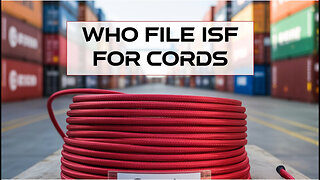Premium Only Content

Unlocking the Secrets of ISF and ABI: The Backbone of Customs Brokering
License To Import // 323-578-6432 // file@licensetoimport.com // www.licensetoimport.com
Welcome back to our customs brokerage and international trade series. Today, we will delve into the relationship between Importer Security Filing (ISF) and Automated Broker Interface (ABI), two crucial components of the customs brokerage process. ISF is a requirement by US Customs and Border Protection (CBP) that mandates importers to furnish specific information about their cargo prior to its arrival in the United States. On the other hand, ABI is an electronic data interchange system that enables customs brokers to electronically transmit information to CBP, acting as a communication gateway. The ISF data, which includes details such as the shipper's name, consignee's name, container details, and origin of the goods, is transmitted from the importer through ABI to CBP. ABI validates the ISF data by cross-referencing it with various references and regulations, flagging any issues or discrepancies for customs brokers to address. This collaboration ensures compliance with CBP regulations, reducing the risk of penalties or delays. Moreover, the timeliness of data transmission is of utmost importance, as ISF must be submitted at least 24 hours before the cargo is loaded onto a vessel bound for the United States, allowing CBP to conduct risk assessments and focus on high-risk cargo. In conclusion, understanding the interplay between ISF and ABI is vital for efficient customs brokerage, as it enables the smooth transmission, validation, and compliance of cargo information, leading to improved trade facilitation. Thank you for joining us today, and we look forward to exploring more in-depth customs brokerage and international trade topics in future videos.
#usimportbond #isfcustomsbroker #uscustomsclearing #isfentry
Video Disclaimer Here: This video is solely for education and is not endorsed by any US government agency.
00:31 Importer Security Filing (ISF) and Automated Broker Interface (ABI) are crucial components of the customs brokerage process, mandated by U.S. Customs and Border Protection (CBP).
00:53 ABI serves as an electronic data interchange system that enables customs brokers to transmit information to CBP, facilitating efficient communication and data exchange.
1:10 ISF provides vital cargo information, which is transmitted through ABI to CBP for validation against regulations. Any issues are flagged for corrective actions, ensuring compliance and reducing penalties or delays.
1:51 Timely submission of ISF, at least 24 hours before cargo loading, allows CBP to conduct risk assessments and target high-risk cargo efficiently. The ISF-ABI relationship is essential for smooth customs brokerage, compliance, risk mitigation, and efficient trade facilitation.
-
 1:25
1:25
License To Import
1 month agoWho File ISF For Cords
21 -
 LIVE
LIVE
Barry Cunningham
3 hours agoPRESIDENT TRUMP HAS ENTERED THE END GAME AND DEMOCRATS ARE NOW IRRELEVANT!
7,665 watching -
 LIVE
LIVE
Jorba4
1 hour ago🔴Live-Jorba4- The Finals
73 watching -

Blabs Games
11 hours agoApex Legends With Josiah & Mozz
94 -
 1:01:56
1:01:56
BonginoReport
5 hours agoDems Scramble To Rebrand and it’s a BIG FAIL - Nightly Scroll w/ Hayley Caronia (Ep.114)
77.3K84 -
 LIVE
LIVE
Eternal_Spartan
19 hours agoEternal Spartan Plays Final Fantasy 7 Remake Pt. 5 | USMC Vet | Join the Best Chat on Rumble!
90 watching -
 LIVE
LIVE
ZWOGs
6 hours ago🔴LIVE IN 1440p! - Kingdom Come Deliverance, Trying Off The Grid, and More! - Come Hang Out!
61 watching -
 1:10:27
1:10:27
Katie Miller Pod
7 hours ago $1.30 earnedEpisode 2 - Sage Steele | The Katie Miller Podcast
16.8K1 -
 6:32:18
6:32:18
MattMorseTV
10 hours ago $27.57 earned🔴Trump's meeting with Zelenskyy - LIVE🔴
114K81 -
 1:09:56
1:09:56
Kim Iversen
4 hours agoTrump Floats Sending U.S. Troops To Ukraine | Bill And Hillary Clinton Questioned Over Epstein Files
70.8K87